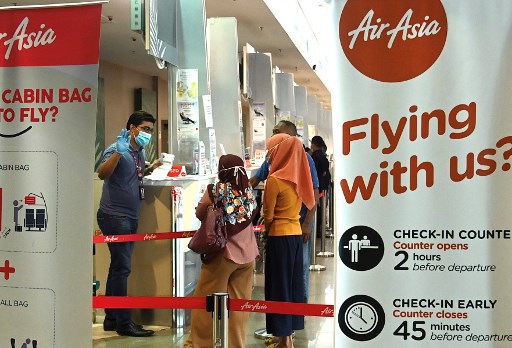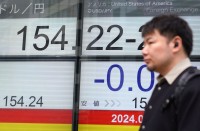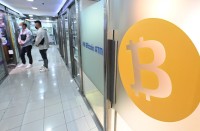
HONG KONG, China (AFP) — Asian markets dropped Thursday as the economic reality of the coronavirus crisis became even starker, and China-US relations soured, overshadowing recent optimism over the easing of lockdown measures.
With countries from Asia-Pacific to Europe and US states reopening their shattered economies, global equities have enjoyed a strong revival after crashing in March, with oil also getting much-needed support from hopes for a pick-up in demand.
But a slew of monumentally bad data has highlighted the struggle governments face is reigniting economies, with hundreds of millions of people left jobless and countless companies going under or on the brink.
On Thursday the Bank of England said it expects Britain’s economic output to crash 14 percent this year, while data showed France’s industrial output collapsed 16.2 percent in March on a monthly basis.
China presented a mixed bag of trade data, with exports showing a surprise jump in exports but imports tumbling. While the rise in overseas shipments was welcome, observers said it was partly boosted by sales of medical equipment and much worse figures were to be expected over the coming months.
That came a day after payrolls firm ADP said the US private sector lost 20.2 million jobs last month alone, sending shivers through markets, days ahead of the release of a key government report that is forecast to show a historic fall in employment.
And the European Commission forecast the eurozone economy would shrink 7.7 percent this year, while India reported its crucial service sector — which makes up more than half of GDP — collapsed in April.
“Sentiment appears to be shifting lower as the scope of shutdowns and travel restrictions are giving rise to economic uncertainty, which is gradually retaking hold, even more so ahead of what’s bound to be a dreary (US jobs) report on Friday,” said AxiCorp’s Stephen Innes.
After losses in Europe as well as the Dow and S&P 500 on Wall Street, Asia turned red.
Hong Kong slipped 0.6 percent and Shanghai eased 0.2 percent, while Mumbai dropped 0.9 percent and Bangkok shed more than one percent. Sydney eased 0.4 percent and Seoul was flat.
But Tokyo, which was returning after an extended holiday weekend, ended 0.2 percent higher, while there were also gains in Wellington and Taiwan as well as Manila despite data showing the Philippines economy shrunk in the first quarter for the first time in more than two decades.
In early trade, London, Paris and Frankfurt started on the front foot.
– ‘Lasting effects’ –
“We remain concerned about the potential for the pandemic to have lasting effects on growth,” Ron Temple of Lazard Asset Management said. “Countries and companies are likely to exit the crisis with significantly higher debt, curtailing their ability to invest and innovate.”
Investors are growing increasingly worried about rising tensions between China and the United States after Donald Trump and Secretary of State Mike Pompeo hit out at Beijing’s handling of the pandemic, accusing it of a cover-up.
China has hit back, saying the White House is telling lies for domestic purposes, and the row has fanned worries the economic superpowers will renew their trade war that hammered global markets last year.
The Financial Times, citing officials in Washington, reported that Trump is looking into stepping up sanctions on China with curbs on supply chains and investment flows.
Such moves would endanger a fragile truce between the two sides that was agreed late last year and which brought some stability to the global economy after almost two years of tariff bickering.
OANDA’s Edward Moya added: “Trump expects China to live up to their end of the trade deal and that seems to have no chance of happening because of COVID-19.”
Oil prices sank more than one percent, extending Wednesday’s losses that ended a five-day rally.
– Key figures around 0720 GMT –
Tokyo – Nikkei 225: UP 0.3 percent at 19,674.77 (close)
Hong Kong – Hang Seng: DOWN 0.6 percent at 23,986.42
Shanghai – Composite: DOWN 0.2 percent at 2,871.52 (close)
London – FTSE 100: UP 0.2 percent at 5,866.75
West Texas Intermediate: DOWN 1.6 percent at $23.61 per barrel
Brent North Sea crude: DOWN 1.0 percent at $29.42 per barrel
Euro/dollar: DOWN at $1.0791 from $1.0796 at 2100 GMT
Dollar/yen: UP at 106.24 yen from 106.09 yen
Pound/dollar: UP at $1.2382 from $1.2337
Euro/pound: DOWN at 87.15 pence from 87.49 pence
New York – Dow: DOWN 0.9 percent at 23,664.64 (close)
— Bloomberg News contributed to this story —
© Agence France-Presse







